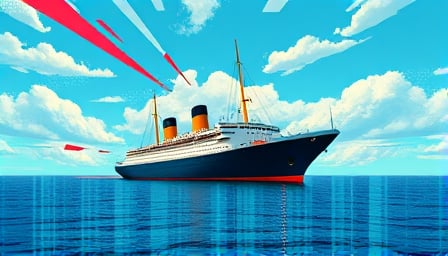Executive Summary
Royal Caribbean Cruises Ltd. (RCL) has experienced a pronounced uptick in its share price over the past twelve months, culminating in a 52‑week high that has bolstered its market capitalization to new record levels. The upward trajectory of RCL’s equity is consistent with broader positive momentum in the cruise sector, exemplified by Carnival Corp.’s recent revision of its annual profit outlook upward. Concurrently, the sector’s shipbuilding arm is gaining traction, with Fincantieri securing a new contract to design and construct two vessels for TUI Cruises—a joint venture that includes RCL as a shareholder. While RCL’s food subsidiary, RCL Foods, grapples with a sector‑specific crisis in sugar imports and regulatory uncertainty, the parent company’s core operations appear insulated from this disruption.
These developments collectively underscore a pivotal juncture for the cruise industry, wherein short‑term gains in investor sentiment and market expansion are precursors to longer‑term structural shifts in consumer behavior, supply‑chain resilience, and omnichannel retail strategies.
Market Performance and Investor Confidence
| Metric | RCL | Carnival Corp. | Industry Context |
|---|---|---|---|
| 52‑week share‑price peak | ↑ | N/A | Reflects sustained investor optimism |
| Market capitalization | ↑ | N/A | Indicates confidence in growth trajectory |
| Profit forecast adjustment | N/A | Upward revision | Signals robust demand and higher onboard spending |
RCL’s share‑price rally aligns with a broader trend of elevated valuation multiples in the leisure travel sector. Investors appear to be pricing in not only the current performance of onboard revenue streams but also anticipated capital expenditures associated with fleet expansion, as evidenced by the Fincantieri contract. The upward revision in Carnival Corp.’s profit forecast further reinforces sectoral confidence, suggesting that RCL’s relative position within the competitive landscape is strengthening.
Supply‑Chain and Production Dynamics
Shipbuilding Innovation
The agreement between Fincantieri and TUI Cruises to design and construct two new cruise ships demonstrates the sustained demand for modern, efficient vessels. This contract is noteworthy for several reasons:
- Technological Upgrades – New builds often incorporate advanced propulsion systems, lower emissions, and energy‑efficient HVAC solutions, aligning with evolving regulatory standards and consumer expectations for sustainability.
- Capacity Expansion – By adding to RCL’s fleet, TUI Cruises can increase itineraries, potentially capturing market share in high‑growth regions such as the Mediterranean and Pacific.
- Cost Synergies – Joint‑venture collaborations enable economies of scale in procurement and construction, thereby reducing unit costs and improving margin profiles.
Consumer Goods and Food Supply Constraints
RCL Foods, a subsidiary focused on provisioning for the cruise fleet, faces headwinds due to a global sugar sector crisis. Import restrictions, deregulation pressures, and financial rescues are exerting downward pressure on margins. Although this issue is geographically and operationally distinct from RCL’s core cruise operations, it signals a broader vulnerability in the supply‑chain network that could affect ancillary revenue streams in the medium term.
Consumer Behavior Shifts and Omnichannel Retail Implications
| Trend | Impact on RCL | Strategic Implications |
|---|---|---|
| Rise in experiential spending | Higher onboard spending | Invest in premium in‑port experiences and bespoke itineraries |
| Shift toward digital engagement | Growth in online booking and loyalty apps | Accelerate omnichannel integration across web, mobile, and on‑board kiosks |
| Demand for sustainability | Increased regulatory scrutiny | Adopt green technologies and transparent sourcing |
| Preference for flexible itineraries | Greater customer churn | Offer modular cruise packages and dynamic pricing |
The convergence of these behavioral trends suggests that RCL must deepen its omnichannel footprint to capture value beyond traditional ticket sales. Strategies could include:
- Integrated Loyalty Platforms that reward repeat customers across multiple touchpoints, from pre‑boarding digital check‑in to post‑cruise surveys.
- Data‑Driven Personalization leveraging customer purchase history to tailor onboard experiences (e.g., dining options, spa treatments, shore excursions).
- Cross‑Sector Partnerships with hospitality brands, technology firms, and sustainability consultancies to enhance brand positioning and create differentiated value propositions.
Long‑Term Structural Transformation
While short‑term market movements reflect investor enthusiasm, the underlying industry transformation is driven by several key forces:
- Fleet Modernization – The push toward low‑emission vessels will reshape capital allocation and operational cost structures.
- Digitalization of the Guest Journey – Seamless integration of pre‑arrival, onboard, and post‑arrival services will redefine customer expectations.
- Supply‑Chain Resilience – Diversification of suppliers and adoption of blockchain for provenance tracking will mitigate risks similar to those faced by RCL Foods.
- Regulatory Evolution – Climate‑centric regulations and health‑safety protocols will necessitate continuous adaptation.
RCL’s current performance, underpinned by robust capital markets and strategic partnerships, positions it to navigate these dynamics effectively. However, sustained success will depend on the company’s ability to translate short‑term gains into long‑term operational resilience and brand differentiation in a highly competitive and rapidly evolving sector.
Conclusion
Royal Caribbean Cruises Ltd. demonstrates a compelling case of market confidence aligning with tangible sector growth. Its share‑price appreciation and heightened market capitalization mirror broader industry optimism, while strategic contracts in shipbuilding and proactive responses to consumer trends signal an agile approach to long‑term value creation. Conversely, sector‑specific challenges, such as the sugar import crisis impacting RCL Foods, highlight the necessity for diversified supply chains and risk management frameworks. As the cruise industry continues to evolve, companies that successfully integrate omnichannel retail strategies, embrace sustainability, and cultivate resilient supply chains will likely emerge as leaders in the post‑pandemic travel landscape.
